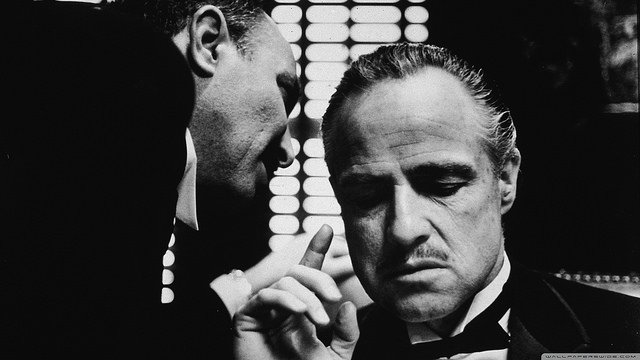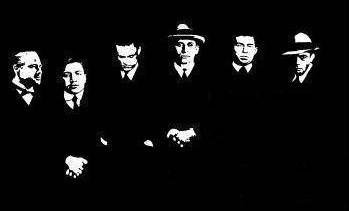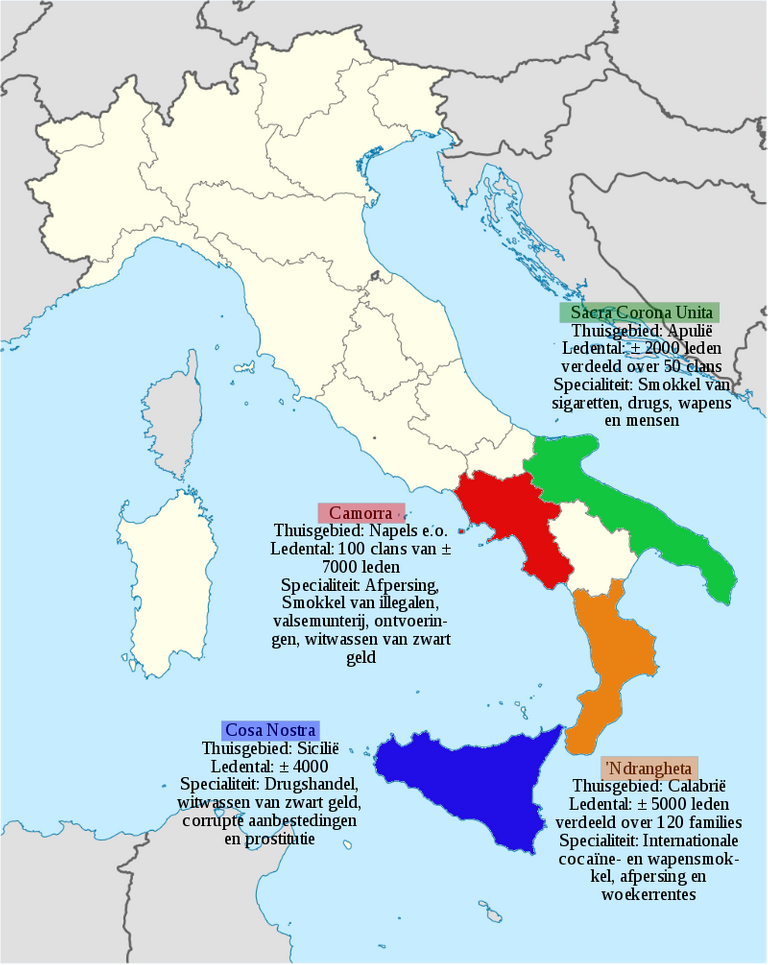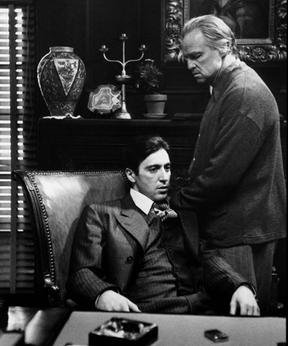A mafia is a criminal organization whose activities are subject to hidden collegial leadership and which is based on a strategy of infiltration of civil society and institutions. There is also talk of a mafia system. The members are called "mafia" (without distinction of number), or sometimes "mafiosi", according to the Italian name (in the singular: "mafioso").

The term "mafia" has various possible etymologies that are more or less verifiable and credible. In the 1860s, the term appears in the official documents and communications officials at the time to designate, at one and the same time, an association of criminals and a behavior of the Sicilian society commonly accepted at the time2.
According to Giuseppe Pitré's historical account of the popular traditions of this period (1841-1916), whose works were strongly questioned by some historians of the mafia itself (John Dickie will point out that Pitré was then a close associate of the deputy and notorious mafioso Raffaele Palizzolo3), the term was also used as a synonym for beauty, bravado and daring in the popular language of a district of Palermo (Italy). This same etymological meaning will be taken up by Diego Gambetta in 1993, in his book The Sicilian Mafia: the Business of Private Protection4, while John Dickie insists on the ambivalence of the term, designating, both in turn and behavior a macho known as "honor" and a criminal association proper ... According to Dickie, some authors of the time would have openly insisted on the first meaning to make believe their contemporaries the absence of any form of criminal association.
The term taken in its proper criminal sense would have appeared 2 from 1863, with the play I mafiusi di la Vicaria by Giuseppe Rizzotto and Gaetano Mosc, which was a great success and was translated into Italian, Neapolitan and Meneghino, then broadcasting the true meaning of this term throughout the national territory of Italy 2. In this play, the character of the mafioso is the "camorista" or the man of honor, that is to say the one who adheres to a society openly opposing government institutions and exhibiting, thus, courage and superiority. According to J. Dickie, the widespread dissemination of this play would be at the origin of the myth of the mafia protector of the weak and symbol of honorable behavior on the part of its members 2. In its report of 1864 on public safety in Sicily, Baron Niccolò Turrisi Colonna does not speak of mafia, but rather of "sect" 2 and Dickie affirms that it is the Italian government which popularized the term in its current criminal sense 2.
A confidential document signed in April 1865 by the marquis and prefect of Palermo Filippo Antonio Gualterio, mentions the presence and the existence of the mafia under the formulation "Mafia, o associazione malandrinesca" (in French: the mafia, or association of malandrins) . According to Gualterio, the Mafia offered its help and protection to opponents of the government2. Therefore, taking into account these recommendations, the Italian government will send to Sicily, during 6 months, a strong troop of 15,000 soldiers to counter any form of popular political opposition 2. According to Dickie, Gualterio would have knowingly described the actions the mafia as opposing maneuvers to overthrow the said government, while some of its most important leaders such as Antonino Giammona, had instead sided with the government2. This report will also provoke a long controversy over the meaning of the word "mafia", with some claiming that it means "honorable and brave behavior", others saying, on the contrary, that it did indeed describe a criminal organization. So that in 1877, the report of Leopoldo Franchetti and Sidney Sonnino will describe the mafia as an "industry of violence" and the notion of criminal association will be confirmed again by the report Sangiorgi published at the turn of the twentieth century.
Other etymological meanings and definitions later evoked will provoke irony in Leonardo Sciascia's new Philology (1973, in La Mer couleur de vin), which will feature two Mafiosos with opposing meanings essentially aimed at confusing and misleading the reader. stunned 2.

The Sicilian mafia: onorata societa, omertà, etc.
Map showing the Muslim conquest in southern Italy and the emirate of Sicily in the 9th century.
Map showing the Muslim conquest in southern Italy and the emirate of Sicily in the ninth century.
Historical regions of Southern Italy, cradle of the mafias. It is possible that these mafias have their origins during the Muslim conquest, when the Christian princes took the maquis to continue to control their lands in secret. These mafias were known to the world only with Italian immigration, which will begin in the nineteenth century, when the world is actually acquainted with this ancestral Italian system.
Historical regions of Southern Italy, cradle of the mafias. It is possible that these mafias have their origins during the Muslim conquest, when the Christian princes took the maquis to continue to control their lands in secret. These mafias were known to the world only with Italian immigration, which will begin in the nineteenth century, when the world is actually acquainted with this ancestral Italian system.
The mafia at the origin is therefore Sicilian. It appears in the second half of the nineteenth century. In the first half of the nineteenth century, the aristocracy left more and more room for the bourgeoisie in land management. In general, taxes have increased; lands formerly reserved for the poor have been confiscated and privatized. With the connection to Italy (1861), new taxes imposed by the North are added, making the situation untenable. It is in this context that the mafia arises.
The Mafioso is at first a wretch, driven from his lands, forced to wander, begging, brigand, praising his services, racketeering. But there is another type of mobster: the rich, the possessor who expels and who remunerates the big arms who expel, collect the taxes, extort the funds under the threat of the weapon, without going through the courts (too lax of anyway). At a time when the poor and the rich will become poorer, the links will be tightened; as the difficulties increase, the value of the given word increases, so is born the sociate onorata, the society of men of honor, those who keep their word and their language. With the mafia the notion of omerta is sealed. Every "man of honor" must hold his tongue, he must prefer silence to denunciation, action to talk. Omerta is man (omu) and humility (umiltà), humble, respectable, worthy of the name, who is silent and acts. It is undeniably in a context of extreme poverty that the mafia develops: without extreme conditions, henchmen are difficult to recruit, and without a henchman ready to execute orders, there is no organization .
The mafia is also linked to the notion of "godfather". The sponsor is the head of the organization, the one who accumulates the most wealth and the one who makes all the decisions. Every man owes him "respect"; whoever breaks this rule must die. Originally, the mafia is organized, it has a leader and performers; but as poverty increases in Sicily at the end of the nineteenth century, the more the "mafias" will prosper and organize, the more they will be numerous and compete for control of territories and incomes..svg.png)
![800px-Maffiabendes.svg.png]
( )
)
The first Godfather: "Don Vito" (1862-1943)
The first real "godfather" of the mafia is Vito Cascio Ferro. It modernizes the organization, imposes the pizzo, tax (racket) to all traders. He says he's going to "peck" at traders as the sparrow bites its beak in a puddle to drink; hence the term "pizzo". He is the godfather who oversees all the capos who themselves lead all the henchmen. Each capo has a consigliere (right arm). "Don Vito", as he is called, will never fail, dotting his life with many deaths. He is the legend that inspired the character of the movie The Godfather lending his nickname and his name to Don Vito Corleone (the name of Corleone being borrowed from the village of the mafia hardest known Sicily: Corleone, south-west from Palermo). It was he who exported the mafia to the United States at the end of the nineteenth century.
Source: https://fr.wikipedia.org/wiki/Mafia
Copying/Pasting full texts without adding anything original is frowned upon by the community.
Some tips to share content and add value:
Repeated copy/paste posts could be considered spam. Spam is discouraged by the community, and may result in action from the cheetah bot.
If you are actually the original author, please do reply to let us know!
Thank You!
More Info: Abuse Guide - 2017.
welcom my frined
Good bro
thank you
up
up
The mafia, like everything else, has evolved to the point that today it is more entrenched. There are few countries that have been able with it
Yes I agree with you
up
Casa nova
yes :)
Thanks for your research brother,
here I found some intersting stuff that may apply to your article aswell
The word 'Mafia' was first mentioned in literature was published in a list of heretics in 1668. It followed the name of a witch, and meant 'boldness', 'ambition', and 'arrogance'. None of these qualities were considered proper for a woman, and thus the word 'mafia' took on its first negative connotation.
Many people also believe that Arabic affected the word 'mafia' during the period of Arab control of Sicily, after the fall of the Roman Empire in 846 AD. 'Mahias' is an Arab word meaning 'bold man', and this is believed to be incorporated into the modern term mafia, which also implies the bold and aggressive nature of its constituents.
Thank you for adding information
up
good
thank you
up votiw a khout
Great article brother
thank you bro
up
Good
thank you
Your post has been resteemed to my 2500 followers
Upvote this comment if you like this service
thank you
Good job bro
thank you
up
up
up
Nice bro
thnak you khouya
up